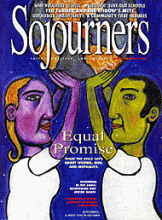"The hardest part in this is seeing the pain, not only the pain of those I love, but the pain of everybody involved. I am sorry for that pain, I mean really sorry....I have another 10 or 15 minutes before I have to give this pen up. What can be said in 15
minutes? The fear settles in, the inevitable fear of the unknown. Trust in God, faith that things will be okay. No more words...."
The above comes from a remarkable journal in which Robert Wallace West chronicles his last monthand hourson death row. Moments after writing those words, he walked to the execution chamber, allowed himself to be strapped down on the gurney, then watched while the "technician" inserted the needles and the fatal injection. Wallace was prounced dead at 6:41 p.m. on July 29, 1997.
Sister Helen Prejeans riveting book, and subsequent movie, Dead Man Walking, allowed the world to glimpse the rare and quite courageous people who gather around each man and woman sentenced to death in our country. These communities, for they are truly that, ask the same question in the midst of the admittedly complex realities surrounding those who have killed others: What good does capital punishment accomplish?
One of the ways for those who walked with Bobby West (and I have observed one of them, another Catholic sister, Jean Amore, as she corresponded, prayed, and wept with him on his last journey) to ask this central question was by publicizing his journal. The entries, as he nears the inevitable, make compelling reading. One cannot believe how banal and polite is the entire process as seen through this "dead mans" eyes:
Two hours before execution: "The last meal was served 20 minutes ago, cheeseburger, fries and coke....Chaplain at my door, guards checking every couple minutes, asking if I need anything and taking care of my needs. The AC is getting colder. They have cookies and crackers and fruit juice."
Read the Full Article
